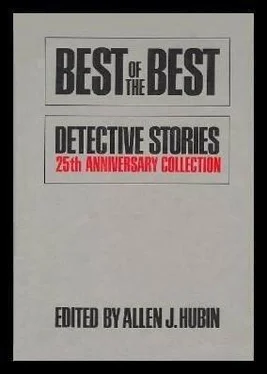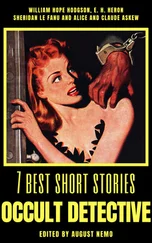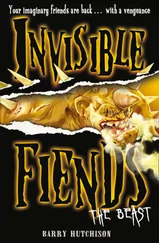Stephen Barr - Best of the best detective stories - 25th anniversary collection
Здесь есть возможность читать онлайн «Stephen Barr - Best of the best detective stories - 25th anniversary collection» весь текст электронной книги совершенно бесплатно (целиком полную версию без сокращений). В некоторых случаях можно слушать аудио, скачать через торрент в формате fb2 и присутствует краткое содержание. Город: New York, Год выпуска: 1971, ISBN: 1971, Издательство: E.P. Dutton & Co., Жанр: Детектив, на английском языке. Описание произведения, (предисловие) а так же отзывы посетителей доступны на портале библиотеки ЛибКат.
- Название:Best of the best detective stories: 25th anniversary collection
- Автор:
- Издательство:E.P. Dutton & Co.
- Жанр:
- Год:1971
- Город:New York
- ISBN:978-0-525-06450-3
- Рейтинг книги:5 / 5. Голосов: 1
-
Избранное:Добавить в избранное
- Отзывы:
-
Ваша оценка:
- 100
- 1
- 2
- 3
- 4
- 5
Best of the best detective stories: 25th anniversary collection: краткое содержание, описание и аннотация
Предлагаем к чтению аннотацию, описание, краткое содержание или предисловие (зависит от того, что написал сам автор книги «Best of the best detective stories: 25th anniversary collection»). Если вы не нашли необходимую информацию о книге — напишите в комментариях, мы постараемся отыскать её.
Best of the best detective stories: 25th anniversary collection — читать онлайн бесплатно полную книгу (весь текст) целиком
Ниже представлен текст книги, разбитый по страницам. Система сохранения места последней прочитанной страницы, позволяет с удобством читать онлайн бесплатно книгу «Best of the best detective stories: 25th anniversary collection», без необходимости каждый раз заново искать на чём Вы остановились. Поставьте закладку, и сможете в любой момент перейти на страницу, на которой закончили чтение.
Интервал:
Закладка:
All was quiet in the kitchen behind THE ALMOST ANYTHING SECOND-HAND GOODS AND OUTLET STORE. Granny Goodeycoonce was pasting in her scrapbook the latest letter she had received in reply to a message of congratulations sent on the birthday of one of the Princesses of the Netherlands. It read, as did all the others in the scrapbook: The Queen has read your letter with interest and directs me to thank you for your good wishes. And it was signed, as nearly as could be made out, Squiggle Van Squiggle, Secretary.
“Gee,” said Neely, looking up from a trade journal he was reading, “here’s a bait business for sale on Long Island, on the North Shore.” There was no answer. He tried again. “And a boat basin in Connecticut. ‘Must be sold at once,’ the ad says, ‘to settle estate.’ Gee.”
His grandmother capped the tube of library paste. “I suppose Princess Beatrix will be getting engaged pretty soon,” she observed. “I wonder who to. How old is the Crown Prince of Greece? No, that wouldn’t do, I suppose; he’ll be King of Greece some day, and she’ll be Queen of Hol land. Hmm.” She knit her brows, deep in the problems of dynasty.
“They could be combined,” Neely suggested.
Granny Goodeycoonce looked up, amazed. “What, Greece and Hol land?”
“No, I mean a bait business and a boatyard. People,” he explained enthusiastically, “would buy bait to fish with from their boats . And—”
She clicked her tongue. “The idea! A Goodeycoonce becoming a fishmonger!”
“Better than being a river pirate,” he mumbled.
“Never let me hear you use that word again!” she snapped. “The very idea! Have you no respect for the traditions of the family? Why, it makes my blood boil! And don’t you forget for one minute, young man, that I am a Goodeycoonce by descent as well as by marriage; don’t you forget that! ”
“Fat chance,” Neely muttered.
His grandmother opened her mouth to release a thunderbolt, but at that moment there came a thud from the cellar, followed by a clatter.
“Oh, my land,” Granny whispered, a hand at her throat. “Rats! I should’ve listened to that Limey. Is the door to the cellar locked?”
Answer was superfluous, for at that moment the door swung open and in stepped the Limey himself, more properly described as Arthur Marmaduke Roderick Lodowicke William Rufus de Powisse-Plunkert, Baron Bogle, Earl of Ballypatcoogen, Viscount Penhokey, Laird of Muckle Greet, Master of Snee, 11th Marquess of Grue and Groole in the Peerage of England, and Hereditary Lord High Keeper of the Queen’s Bears. “Good evening, all,” he said.
Neely went pale. “I knew it!” he cried, “I knew we couldn’t go on getting away with it forever, not after almost three hundred years! That exterminator story was just a dodge — he must be from the Harbor Patrol, or the Coast Guard!”
The Marquess took his swagger stick from the quivering Denny (who had made the underground voyage with his head under his coat, for fear of bats), and smacked it gently into the palm of his hand. “You know, I resent that very much,” he said, a touch of petulance in his voice. “I will have you know that I am no copper’s nark, common informer, or fink. I—”
“You get out of my house,” said Granny Goodeycoonce, “or I’ll—”
“Call the police? Oh, I doubt that, my good woman; I doubt that entirely. How would you explain all those cork fenders in the cellar? The copper cable, raw rubber, Turkish Sipahi cigarettes, Polish hams? To say nothing of enough sailcloth to supply a regatta, a ton of tinned caviar, five hundred oka of Syrian arrack, twenty canisters of ambergris, several score pods of prime Nepauli musk, and, oh, simply ever so many more goodies — all of which, I have no hesitation in declaring, are the fruits of, I say not ‘theft,’ but of, shall I say, impermissive acquisition. Eh?”
Granny Goodeycoonce, during the partial inventory, had recovered her aplomb. “Well, you simply couldn’t be more wrong,” she said, a smile of haughty amusement on her lips. “ ‘Impermissive’? Poo. We have the best permission anyone could ever want. Neely, show this foreign person our permission.”
Still pale, and muttering phrases like I’ll be an old man when I get out, Neely unlocked an antique cabinet in one corner of the room and removed a flat steel case, which he handed to his grandmother. She opened it with a key of her own, and reverently extracted a parchment document festooned with seals, which she displayed to the Marquess with the words: “Look, but don’t touch.”
He fixed his monocle firmly in his good eye and bent over. After a while he straightened up. “Mph. Well, I must confess that my knowledge of Seventeenth Century Dutch orthography is rather limited. But I can make out the name of Van Goedikoentse, as well as that of Petrus Stuyvesant. Perhaps you would be good enough to explain?”
Nothing could have pleased Granny more. “This,” she said in tones both hushed and haughty, “is a Patent from the Dutch West India Company, granting to my great-great-great-great-great-great-great-grandfather, Nicolaes Jacobus Van Goedikoentse, and ‘to his heirs forever,’ the right of collecting customs in the harbor port of Nieuw Amsterdam. It was granted in return for Myn Heer Van Goedikoentse’s valient help in resisting the insolent British demand for surrender in 1662. Governor Stuyvesant promised he would never forget.”
For a moment no word broke the reverent silence. Then, slowly, Lord Grue and Groole removed his cap. “And naturally,” he said, “your family has never recognized that surrender. Madam, as an unreconstructed Jacobite, I honor them for it, in your person.” He gravely bowed. Equally gravely, Mrs. Goodeycoonce made a slight curtsy. “Under no circumstances,” he went on, “would I dream of betraying your confidence. As a small effort to amend for the sins of my country’s past I offer you my collaboration — my very, very experienced collaboration, if I do say so.”
Three hundred years (almost) of going it alone struggled in Mrs. Goodeycoonce’s bosom to say No. At the same time she was plainly impressed with Lord Grue and Groole’s offer — to say nothing of his manner. It took her a while to reply. “Well,” she said finally, “we’ll see.”
Don Sylvester FitzPatrick, Second Vice-President of the Mafia (Lower Manhattan Branch), was nervous. The survey was almost finished, and the Grand Council still hadn’t made up its mind about blowing up the Brooklyn Navy Yard. In fact, it was even now debating the project in their Chamber, at the window of the anteroom to which Don Sylvester now sat. Elation at being at long last removed from the artichoke detail had gradually given way to uneasiness. Suppose they did decide to blow it up? Would the United States Government take the same broad view of this as the Dons did? Visions of being hanged from the yardarm of, say, the USS Missouri , danced like sugar plums in Sylvester’s head.
A flutter from the crates at his foot distracted his attention. In one was a black pigeon, in one was a white. Very soon the mysterious Mr. Tosci would appear with $87,000,000 in plain, sealed wrappers, and be told the Grand Council’s decision. Even now the Mafiosi bomb squads were standing by at the ready in Brooklyn. Informed only that morning that police had put the traditional, semiannual wire tap on the Mafiosi phones, the Mafiosi had brought out the traditional, semiannual pigeon post.
“Now, remember,” Don Lefty McGonigle had instructed his son-in-law, “d’ black boid has d’ message Bombs Away awready in d’ cap-sool fastened to its foot. And d’ white boid’s got d’ message Everyt’ing Off inscribed on d’ paper in d’ cap-sool on its foot. Ya got dat?”
Читать дальшеИнтервал:
Закладка:
Похожие книги на «Best of the best detective stories: 25th anniversary collection»
Представляем Вашему вниманию похожие книги на «Best of the best detective stories: 25th anniversary collection» списком для выбора. Мы отобрали схожую по названию и смыслу литературу в надежде предоставить читателям больше вариантов отыскать новые, интересные, ещё непрочитанные произведения.
Обсуждение, отзывы о книге «Best of the best detective stories: 25th anniversary collection» и просто собственные мнения читателей. Оставьте ваши комментарии, напишите, что Вы думаете о произведении, его смысле или главных героях. Укажите что конкретно понравилось, а что нет, и почему Вы так считаете.












